Zi-Yuan Chen
Islander: A Real-Time News Monitoring and Analysis System
Apr 25, 2022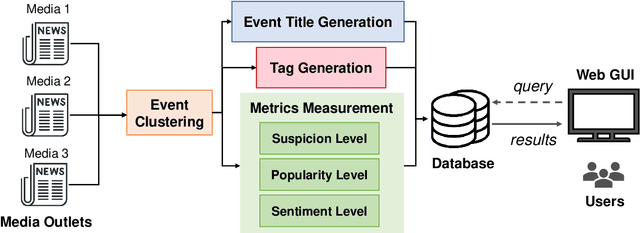
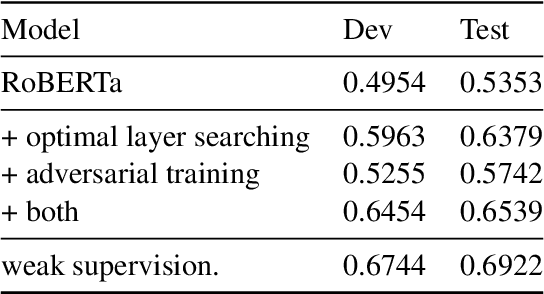
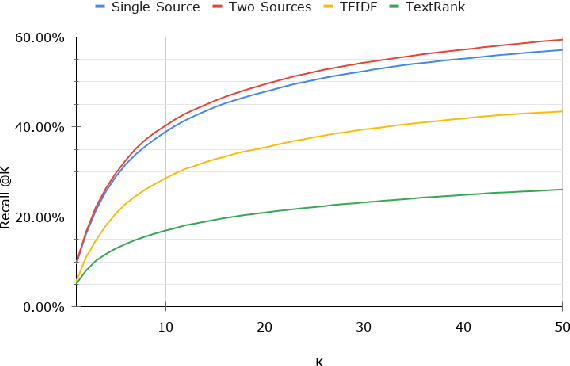
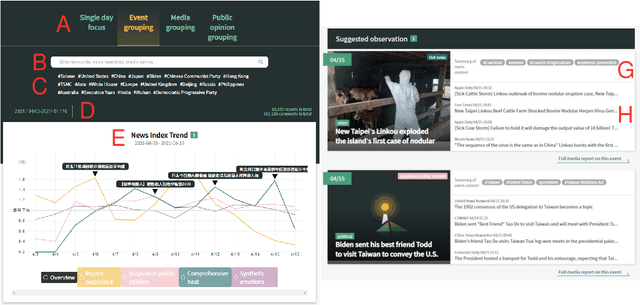
Abstract:With thousands of news articles from hundreds of sources distributed and shared every day, news consumption and information acquisition have been increasingly difficult for readers. Additionally, the content of news articles is becoming catchy or even inciting to attract readership, harming the accuracy of news reporting. We present Islander, an online news analyzing system. The system allows users to browse trending topics with articles from multiple sources and perspectives. We define several metrics as proxies for news quality, and develop algorithms for automatic estimation. The quality estimation results are delivered through a web interface to newsreaders for easy access to news and information. The website is publicly available at https://islander.cc/
Knowledge-Enriched Visual Storytelling
Dec 03, 2019



Abstract:Stories are diverse and highly personalized, resulting in a large possible output space for story generation. Existing end-to-end approaches produce monotonous stories because they are limited to the vocabulary and knowledge in a single training dataset. This paper introduces KG-Story, a three-stage framework that allows the story generation model to take advantage of external Knowledge Graphs to produce interesting stories. KG-Story distills a set of representative words from the input prompts, enriches the word set by using external knowledge graphs, and finally generates stories based on the enriched word set. This distill-enrich-generate framework allows the use of external resources not only for the enrichment phase, but also for the distillation and generation phases. In this paper, we show the superiority of KG-Story for visual storytelling, where the input prompt is a sequence of five photos and the output is a short story. Per the human ranking evaluation, stories generated by KG-Story are on average ranked better than that of the state-of-the-art systems. Our code and output stories are available at https://github.com/zychen423/KE-VIST.
UHop: An Unrestricted-Hop Relation Extraction Framework for Knowledge-Based Question Answering
Apr 02, 2019

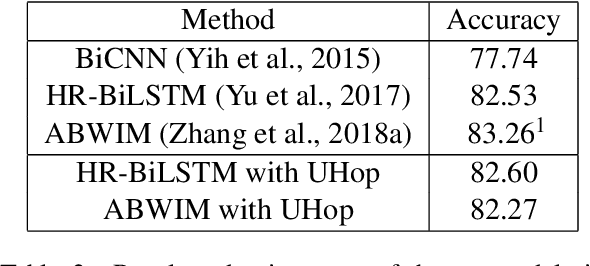
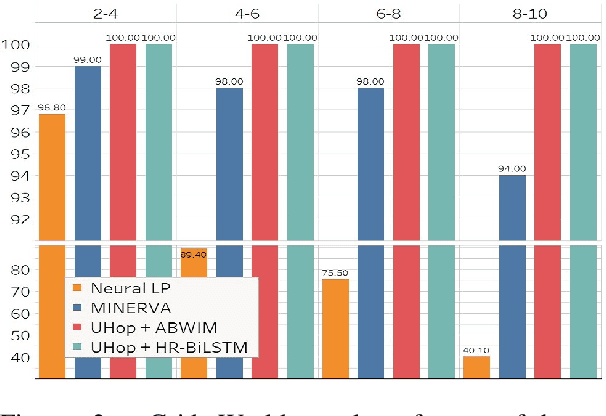
Abstract:In relation extraction for knowledge-based question answering, searching from one entity to another entity via a single relation is called "one hop". In related work, an exhaustive search from all one-hop relations, two-hop relations, and so on to the max-hop relations in the knowledge graph is necessary but expensive. Therefore, the number of hops is generally restricted to two or three. In this paper, we propose UHop, an unrestricted-hop framework which relaxes this restriction by use of a transition-based search framework to replace the relation-chain-based search one. We conduct experiments on conventional 1- and 2-hop questions as well as lengthy questions, including datasets such as WebQSP, PathQuestion, and Grid World. Results show that the proposed framework enables the ability to halt, works well with state-of-the-art models, achieves competitive performance without exhaustive searches, and opens the performance gap for long relation paths.
Dixit: Interactive Visual Storytelling via Term Manipulation
Mar 11, 2019



Abstract:In this paper, we introduce Dixit, an interactive visual storytelling system that the user interacts with iteratively to compose a short story for a photo sequence. The user initiates the process by uploading a sequence of photos. Dixit first extracts text terms from each photo which describe the objects (e.g., boy, bike) or actions (e.g., sleep) in the photo, and then allows the user to add new terms or remove existing terms. Dixit then generates a short story based on these terms. Behind the scenes, Dixit uses an LSTM-based model trained on image caption data and FrameNet to distill terms from each image and utilizes a transformer decoder to compose a context-coherent story. Users change images or terms iteratively with Dixit to create the most ideal story. Dixit also allows users to manually edit and rate stories. The proposed procedure opens up possibilities for interpretable and controllable visual storytelling, allowing users to understand the story formation rationale and to intervene in the generation process.
 Add to Chrome
Add to Chrome Add to Firefox
Add to Firefox Add to Edge
Add to Edge